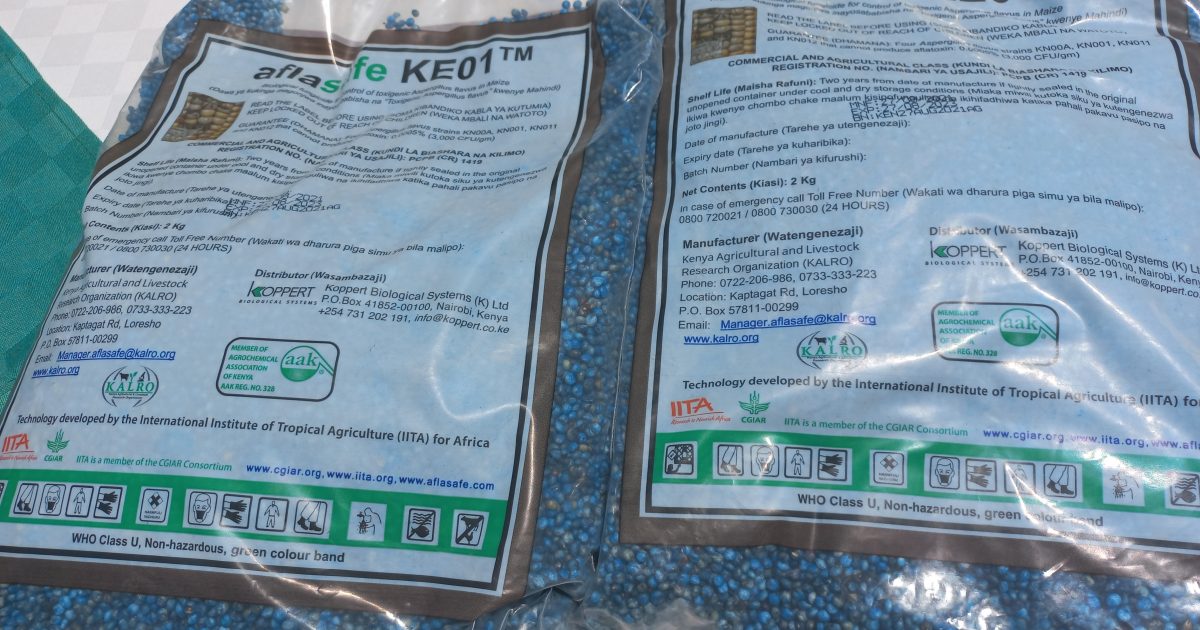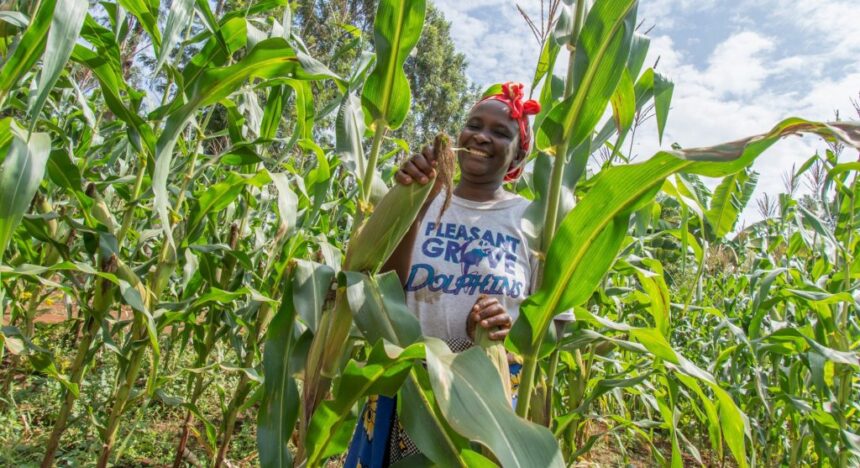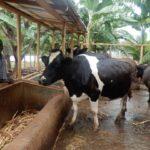BY KNA
Kenya has stepped up research with a view to developing technologies that could mitigate the effects of aflatoxin in the agricultural sector.
Kenya Agricultural Livestock and Research Organization (KALRO and other partners have lately intensified their efforts in the war against aflatoxin contamination by embracing new and appropriate technologies.
Aflatoxin is poison produced by a fungus that resides in the soil and infects crops in the field with the most susceptible crops being maize and groundnuts.
Speaking during an aflasafe dissemination workshop, KALRO Director General Dr. Eliud Kireger said one of the measures is the development and use of product dubbed ‘Aflasafe KE01’ which is a biological control agent that suppresses aflatoxin producing fungi in the soil.
“This product which is made up of four native isolates has demonstrated a high efficacy of up to 98 percent in the reduction of aflatoxin contamination in maize and has the ability to maintain low or no contamination both at pre and postharvest period,” he explained.
Dr. Kireger said the move comes after the losses the farmers, traders and other agencies incurred when contaminated grains were condemned which had a multiplyer effect including decreased animal production, the cost of decontamination and disposal of contaminated produce.
“Aflatoxin contamination also acts as a nontariff barrier to local, regional and international trade since the region where the suspect produce was detected automatically lost marketing prospects or underwent extreme scrutiny,” he noted.

Dr. Kireger observed the need to push for adoption of Aflasafe products through a contract agreement with Koppert Biological Limited under the Public Private Partnership (PPP) to undertake wider distribution of the product but still the uptake has been minimal.
He said the dissemination workshop was geared towards understanding the findings and an evaluation on the effectiveness, demand and scaling potential for Aflasafe in Kenya specifically in Meru and Tharaka Nithi Counties, which are some of worst hit areas.
He called upon the stakeholders especially in the maize value chain to ensure they talked to farmers more on the use of aflasafe which affects the health of people once it is contaminated.
“Contaminated maize is normally given to livestock but the residual effects are passed onto humans through consumption of related products including milk, eggs and meat. The economic significance of aflatoxins mainly on maize grains therefore cannot be over-emphasized,” Dr. Kireger said.
Dr. Kireger added that because of climate change and temperatures increasing, incidence of aflatoxin contamination that were in hotspots areas of semi-arid areas of Meru, Tharaka Nithi, Kajiado, Makueni, Kilifi and Taita Taveta where temperatures are above 25 degrees Celsius and are now being found in Trans Nzoia and even Bungoma which are not traditionally areas known to have aflatoxin.
The DG said it was sad that some farmers’ failure to adopt the use of aflasafe as they saw no added value in terms of money when they use it, yet no one should compromise on their health.

“We all need to work on this and government can also assist in carrying out the message across even if it’s to subsidize the aflasafe which currently is retaining at Sh400 per 2kg bag just like it is doing for subsidy fertilizer for more uptake,” he added.
Dr. Kireger however noted that they were trying to work at a cheaper way of testing for aflatoxin so that farmers or even buyers could instantly know if the maize is contaminated.
They also want to put up a center of excellence for training of not only aflatoxins but also other related post-harvest losses and management technologies
Prof. Jake Ricker Gilbert, Principal Investigator for the Food Processing and Post-harvest Handling (FPIL) project that is to end in May of this year said the research done led to action to provide new technologies to produce the post-harvest loss and also do extension to train farmers, traders and consumers about the best practices as well as also scaling the uptake.
“Some of the technologies that we worked on is good quality food grade taps for drying grain so that it does not come into contact with soil and get fungus, worked on low cost moisture assessment that farmers can test their maize to see if it is safe but we also have an integrated strategy to try and produce post-harvest loss through use of hermetic bags,” he added.
Prof. Gilbert however acknowledged that although the technologies have benefits to the farmers, for most of them, it has been hard to adopt and also invest in them.
“According to the research, the market demand is low as only 9 percent are willing to pay at or above market price, while 33 percent want the prices to be lowered to Sh250. The benefits of using aflasafe were also not directly observable to farmers,” he said.
Prof. Gilbert noted that investing in training to increase the awareness and help farmers understand the benefits of using Aflasafe to improve household food safety especially for those who produce maize was key.
General Manager of Koppert Biological Systems limited Charles Macharia that has been helping in distributing the aflasafe to farmers said they have trained around 50,000 farmers since 2020 on adoption and usage.
“We used to use agro dealers as distribution channels but over time we have found that it is easier to work with structured value chain such as processors of sorghum and groundnuts who have been influencing their farmers to adopt aflasafe,” he said.
Macharia gave an example of a sorghum project that has seen them working with over 100,000 every year on taking up the adoption of the aflasafe unlike in maize. Roasted, sterile sorghum grains usually serve as carrier and nutritive source for the atoxigenic strains
The project was done in partnership with KALRO, Purdue University, USAID, University of Eldoret and other development partners .







